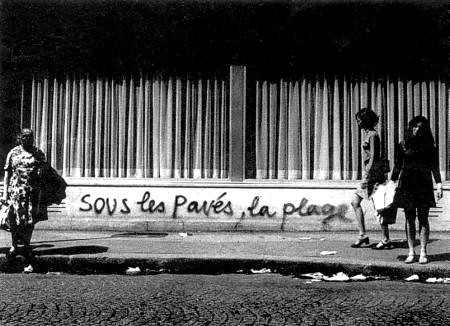Commemoration of May 1968
The May 1968 movement has become a defining moment of French history due to its substantial impact which changed society. 2018 marks the 50th anniversary of this incredibly influential movement. However, now there is this unsolved issue of how to commemorate this historical moment this year which is shown by French president Emmanuel Macron’s indecisiveness; it is unclear if he wants to celebrate this significant moment in French history. Furthermore, it is vital to point out that Macron is the first French president born after 1968. Another French politician who was not quite excited about the commemoration is former French president Nicolas Sarkozy who proposed to “liquidate the heritage of May ‘68” as in his opinion it has “challenged France’s moral order” (Chrisafis, A.), consequently making 68 responsible for certain issues in contemporary France. The only problem with Sarkozy's accusation is the fact that he draws his conclusion from the stereotypical depiction of the movement, namely "the most utopian and irresponsible elements and ideas involved" (Reynolds, 2011). Moreover, some argue that Sarkozy's intention to liquidate 1968 is owing to his fear of what the student movement stands for, namely "collective, mass mobilization". Furthermore, Alain Geismar, one of the main student leaders, claims that the fact that Sarkozy still spoke about it proves how relevant the movement and its message still is: "If the movement was dead now I wonder why Mr. Sarkozy used his last speech before becoming president to say that he has got to kill it" (Geismar in BBC News, 2008).
However, Sarkozy was unable to "delegitimize street protests" (Reynolds, 2011) as he was faced with protests after successfully introducing highly pugnacious pension reforms. All in all, it can be said that the spirit of 68 cannot be eradicated as the notion of protesting and making one's voice be heard is still deeply rooted in French society. As Cohn-Bendit summed it up in a TV debate: "Politically we lost - thank god! - but socially, we won" (Cohn-Bendit in BBC News, 2008).
Politics is not the only area that has been concerned with the memory of 1968. The 1968 movement has also been examined in anumber of films like Philippe Garrel's "La vent de la nuit" (1999) in which Paul, a student, gets to know a middle-aged man, Serge, on different road trips through Europe. It is during these trips where Paul finds out about Serge's participation in the 1968 events. However, there is a misinterpretation of these events indicating the generational divide. Paul is more interested in the use of and Serge's experience with drugs and violence; thus it seems that he is completely unaware of the political and societal challenges or changes. Meanwhile, Serge is struggling to come to terms with the past and is worried about how 1968 is viewed by the younger generation who cannot quite comprehend the situation. In this case Serge can be seen as a representative of 1968's generation while Paul represents the new, younger generation who do not have any link to 1968. As per Chris Reynolds, this movie perfectly indicates "the emerging dominant discourse surrounding the events". Furthermore, the director uses natural light in the film, there are no extra (spot)lights which adds a feeling of somberness to the movie. The following clip will show both Serge and Paul having a conversation about 1968 while driving. One thing that particularly catches one's eye is Serge's rigidity; his facial expression does not change.
https://www.youtube.com/watch?v=ewtvuydl7d8 - Excerpt from Philippe Garrel's "Le vent de la nuit"
Students have continued to play a large role in shaping society all over the world. Most recently, tens of thousands of students took to the street in Hong Kong in 2014 during the so-called ‘umbrella revolution’. At times, it reached over 100,000 protesters. They wanted to protest the political change in how the 2016 Legislative Council election and 2017 Chief Executive election were to be carried out: Beijing would now have the final say in these elections, instead of only Hong Kong citizens. This was deemed to be anti-democratic by many.
Even then, the legacy of May ’68 lived on: some students had posters with “sous les pavés la plage” (under the pavement the beach) written on them - a slogan used by students 50 years prior in France.

Hong Kong. 14-15 October 2014. "Sous les pavés la plage" (Under the pavement the beach.) French Mai 68 slogan reemployed by the students of Hong Kong. http://pro.magnumphotos.com/C.aspx?VP3=SearchResult&VBID=2K1HZO4SB9E5FX&SMLS=1&RW=1000&RH=736

Situationist graffiti in Paris, 1968.http://www.flickriver.com/photos/historywillabsolvemike/2753907376/